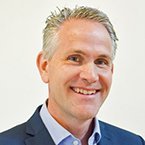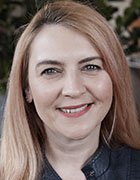
okolaa - Fotolia
CIO interview: Mark Foulsham, chief digital officer, Scope
The charity’s chief digital officer is implementing a three-stage plan to transform the organisation through building internal capabilities and technology stack, as well as creating a digital framework
Mark Foulsham is the epitome of the modern technology leader. After moving beyond IT and into operations as group CIO of Esure, Foulsham looked for a new challenge at the end of 2016, following more than a decade with the insurance specialist. He is now mixing the multiple demands of a new chief digital officer (CDO) post at Scope with a portfolio career.
“It’s a new organisation, a new career model and a new way of working,” he says, talking with Computer Weekly in a coffee shop near the charity’s office in London. “It’s challenging and tiring, but very enjoyable. There are a lot of new and exciting things happening at Scope, and I’m also keeping a strong foothold in other organisations as well.”
Foulsham explains how he is building a portfolio career and playing a crucial role in the charity’s aim of ensuring disabled people have the same opportunities as everyone else.
Foulsham intends to take a progressive approach to timing when it comes to the split between his CDO role at Scope and external opportunities. He spent most of his first five months at Scope working five days a week for the charity.
He is now down to about four days a week and flexible in terms of how much time he needs to commit to Scope. Foulsham ensures weekends are free for his family but recognises a portfolio career does not fit the standard nine to five working schedule. He spoke to other executives and undertook due diligence before taking on a portfolio role.
“You have to be ultra-efficient in terms of time management when you’re self-employed,” he says. “There can be clashes and my approach is to be open and honest. There are no secrets in terms of what I’m doing and who I’m working for – and why should there be?”
Foulsham is already working on a wide range of activities. He is building cross-sector interactions between executives at Scope and c-suite bosses at other firms. Foulsham is also working on consulting projects and CIO coaching, and he is writing a book on cyber security and the impact of the General Data Protection Regulation (GDPR).
Taking on a new challenge
After 12 years at Esure, Foulsham describes his move to Scope and a portfolio career as a cultural awakening. He spent time thinking over his options and spoke with other non-profit organisations before deciding to take up Scope’s offer.
“I wanted to do something purposeful and to have an element of flexibility,” he says. “After such a long time in the finance sector, I was keen to sample another area of business and eager to use my experience to help others. Scope provided a great fit.”
The role also represents a significant challenge. As CDO, Foulsham will play a key role in helping the organisation to change and grow. “We’re working on a fundamental transformation – that means the full business rather than just IT and digital,” he says.

“We’re ensuring we create the right building blocks for change before starting on the more complicated elements of transformation”
Mark Foulsham, Scope
“I’m working to make that change through advanced systems and services. But from the boardroom downwards, everyone in Scope is committed to transformation. There are many people-oriented things we need to do.
“We’re spending significant effort focusing on maturing digital know-how. We’re ensuring we create the right building blocks for change before starting on the more complicated elements of transformation.”
Building effective partnerships
Foulsham refers to a three-stage plan for change. His immediate focus is building internal capability. The second stage will concentrate on developing and supporting foundation technologies, such as customer relationship management and business intelligence systems.
The third stage will centre on the creation and augmentation of a digital framework. “That will involve a lot of work around generally winning over the hearts and minds of people regarding some of the innovative things we want to do,” he says, suggesting work with key suppliers is already under way.
“We’re talking to external partners and they will play a key role in our attempts to create change. There’s a lot of work to do and we won’t be completing any of this change overnight. The partnerships we’re developing are crucial,” says Foulsham.
“We’re looking to create relationships where these partners help us move along on our digital journey. In return, we might also help these businesses to shape their sector-specific offerings.”
Making the most of a personal knowledge base
Foulsham believes his knowledge of transformation will help drive successful change at Scope. He refers to his experience as his personal tool kit. In many ways, he says his key skill is that he understands what not to do, just as much as what elements will prove crucial.
“Moving from a profit-making business to a not-for-profit environment requires a great deal of effort,” says Foulsham. “One of things we’re working to ensure is that my contribution at an executive level is not simply focused on technology.”
Foulsham ran five non-IT functions as group CIO at Esure, including operations, financial crime and facilities management, so he has a strong and broad understanding of the various lines of business. “I feel like I can contribute to all discussions in a productive way,” he says.
“Everyone in the c-suite has something to say about all elements of the business. That is one of the key things I’ve learnt during my time running technology and other areas of the business. I even thought about moving into a full-time chief operations officer role when I left Esure, but I still really enjoy leading technology and I want to drive digital change.”
Moving into the CDO role
The newly created CDO role at Scope gives Foulsham the opportunity he craves. He runs a digital team with an IT function, rather than the other way around, and he expects executives at other organisations to face a similar switch soon.
“Technology is becoming a subset of digital,” says Foulsham. “Actually, the role I’m in now was advertised as a CIO position but I said I thought Scope needed a CDO. That transition is all about flipping the traditional focus of IT leadership on its head and moving towards a more customer-oriented approach.”
Read more charity CIO interviews
- Chief digital officer Jason Caplin is at the helm of the charity’s plans to create a shared data platform, aiming to improve social care services for children.
- The global CIO at Save the Children discusses why one size never really fits all and how IT is transforming to provide digital initiatives.
Foulsham says he aims to push as much technology as possible to the cloud. “I want to create a small internal team of knowledgeable experts that are solely focused on the needs of our customers and our business outcomes. Technology should be all about optimising how well the business can run and serve its clients,” he says.
“In the digital age, IT should just work. Technology might have been commoditised but it must still provide a great service. In many ways, a strong measure of success for any IT leader is creating a technology service that isn’t being talked about in a negative way across the rest of the business.”
Finding innovative ways to build a better business
Foulsham says helping to sponsor the development of a new CDO role at Scope has had a direct impact on the business. “It’s certainly created a debate about what digital means,” he says. “It’s about more than communications, collaboration and marketing. Our belief is digital is about the confluence of advanced technologies to help drive innovation and to develop new business models.”
It is an approach that Foulsham intends to pursue at Scope. “The best organisations in the world, regardless of sector, are great at bringing disparate elements together,” he says. “The most successful businesses operate at the confluence of technology, digital and people.”
Foulsham believes there are huge opportunities to develop interesting ideas in the not-for-profit sector. “It’s a new frontier in terms of business innovation that you don’t appreciate when you’re working in the private sector – necessity really is the mother of invention at a charity,” he says.
“It’s challenging to work in an environment where every pound matters. You must be innovative. The great thing is that many not-for-profits are so eager to drive change through the limited assets at their disposal. It’s a very different world to the private sector but I wanted to do something purposeful and the role makes the most of my experience.”
Facing the future with confidence
Foulsham, then, is enjoying his role at Scope and relishes the opportunity for further change, both in terms of his work at the charity and his personal development as an executive. It is early days, of course, but Foulsham already has a clear idea of what success would like 12 months from now.
“I’d have established the building blocks for transformation at Scope,” he says. “I’d like to think we’d already be seeing the value of some of that work, that we’d be scaling from our successes and learning from our mistakes. I’d also like to think we’ll be making big steps towards being a digitally-enabled organisation. And if I see that happening, then that’s what success will look like for me.”
Foulsham hopes the direct benefits of that digital enablement will be felt beyond the business and outside in the community. “I want to help close the digital divide,” he says, referring to the fact that the 13 million people who are registered disabled in the UK are disadvantaged through 20% lower internet adoption rates.
“I want to help bridge that gap, not just because I believe in the power of technology, but because I believe the right systems and services can help empower people and provide new opportunities,” says Foulsham.











